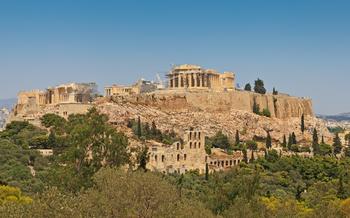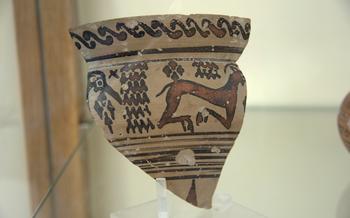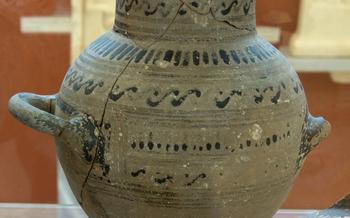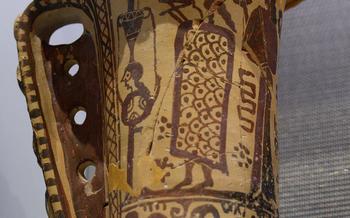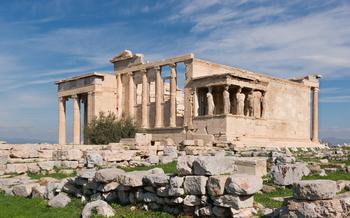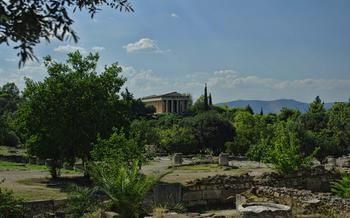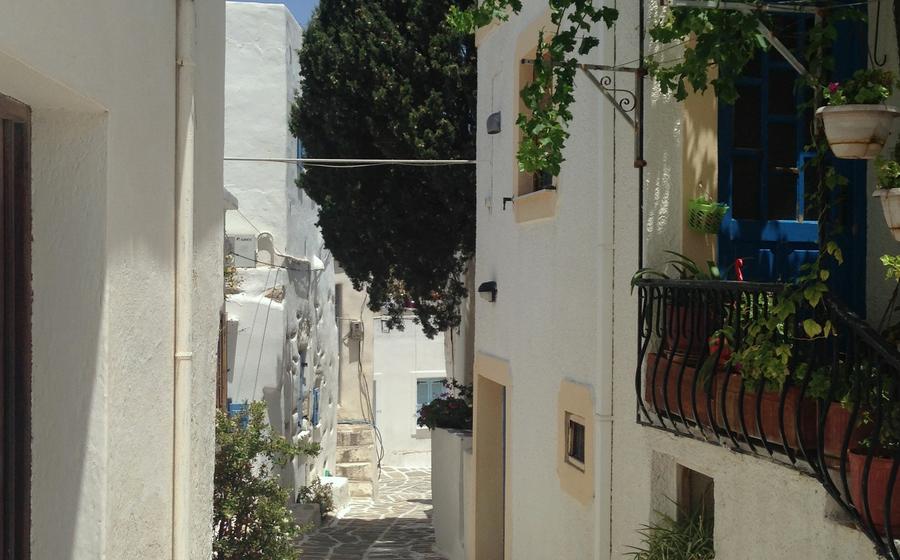
Cycladic Olive Museum
- Cycladic Olive Museum: An Ode to Liquid Gold
- A Journey Through Time: The Museum's Unique Collection
- Olive Oil: The Essence of Greek Cuisine and Culture
- Olive Tree Cultivation in Paros: A Legacy of Excellence
- From Grove to Bottle: The Olive Oil Production Process
- Olive Oil Tasting: A Sensory Experience
- Health Benefits of Olive Oil: A Liquid Elixir
- Olive Oil-Based Cosmetics: A Touch of Nature
- Olive Oil Soaps: Nature's Gentle Cleanser
- Olive Oil Creams and Lotions: Deep Nourishment for Skin
- Olive Oil for Haircare: Silky, Healthy Locks
- DIY Olive Oil Beauty Recipes
- Local Markets and Delicacies: A Taste of Paros
- Olive Oil and the Arts: A Creative Inspiration
- Olive Oil as a Sustainable Resource
- Olive Oil and Mythology: A Divine Gift
- Olive Oil and the Modern World: A Global Treasure
- Insider Tip: Olive Oil Pilgrimage
Cycladic Olive Museum: An Ode to Liquid Gold
The Cycladic Olive Museum in Paros is a treasure trove of knowledge and history dedicated to the island's liquid gold - olive oil. Housed in a charming old olive mill, the museum takes visitors on a journey through the ages, showcasing the rich cultural and agricultural heritage of olive cultivation in the Cyclades.
Nestled in the picturesque village of Lefkes, the museum is easily accessible by car or public transportation. Its location, amidst the idyllic scenery of Paros, provides a perfect backdrop to explore the world of olive oil.
Inside the museum, visitors are greeted by a diverse collection of exhibits that tell the story of olive cultivation and pressing, from ancient times to the present day. A highlight is the impressive collection of traditional tools and machinery used in olive farming and oil production. These include ancient stone mills, wooden presses, and ceramic storage vessels, each a testament to the ingenuity and skill of past generations.
The museum also houses a collection of ancient amphorae and storage vessels, highlighting the significant role olive oil played in trade and commerce throughout the Mediterranean region. Interactive displays and educational panels provide visitors with an immersive and engaging experience, allowing them to delve deeper into the history and cultural significance of olive oil in the Cyclades.
A Journey Through Time: The Museum's Unique Collection
The Cycladic Olive Museum in Paros houses a fascinating collection that takes visitors on a journey through the history of olive cultivation and pressing. From ancient to modern times, the museum showcases the evolution of olive oil production techniques and the tools used in this age-old tradition.
Ancient Olive Oil Production Methods
Visitors can marvel at the ancient olive presses, grinding stones, and amphorae used to store and transport olive oil in antiquity. These artifacts provide a glimpse into the ingenuity and resourcefulness of the ancient Greeks, who relied on olive oil for cooking, lighting, and religious rituals.
Traditional Tools and Machinery
The museum also displays traditional tools and machinery used in olive cultivation and pressing in more recent times. These include hand-operated olive presses, stone mills, and wooden barrels, which offer a tangible connection to the past and demonstrate the physical labor and skill involved in olive oil production.
Ancient Amphorae and Storage Vessels
The museum's collection includes a variety of ancient amphorae and storage vessels used for transporting and storing olive oil. These artifacts showcase the importance of olive oil in trade and commerce throughout the Mediterranean region and provide insights into the logistics of olive oil production and distribution in ancient times.
Interactive Displays and Educational Panels
To enhance the visitor experience, the Cycladic Olive Museum features interactive displays and educational panels that provide detailed information about olive cultivation, pressing techniques, and the cultural significance of olive oil in Greece. These interactive elements make the museum a valuable resource for learning about the history and importance of this liquid gold.
Olive Oil: The Essence of Greek Cuisine and Culture
Olive oil is deeply intertwined with Greek cuisine and culture, serving as more than just a culinary ingredient. It is a symbol of purity, health, and abundance, with a prominent role in traditional dishes and everyday life. In Paros, olive oil takes center stage, featuring in savory pies, fresh salads, and delectable seafood dishes. Its distinct flavor and aroma enhance the taste of simple ingredients, showcasing the essence of Mediterranean cuisine.
Beyond its culinary significance, olive oil holds a special place in Greek culture. In ancient Greece, it was considered a sacred liquid, associated with the goddess Athena. Olive oil was used in religious ceremonies and rituals, symbolizing purity and divine blessings. Today, it remains a symbol of hospitality and generosity, often offered to guests as a token of welcome.
Olive oil's health benefits are also widely recognized, contributing to its revered status in Greek culture. Its high content of monounsaturated fats, antioxidants, and anti-inflammatory compounds makes it a valuable ally for heart health and overall well-being. Greeks have long embraced olive oil as a dietary staple, contributing to their reputation for longevity and healthy living.
To fully appreciate the essence of Greek cuisine and culture, one must indulge in the flavors and traditions surrounding olive oil. Whether savoring a simple drizzle of olive oil on fresh bread, participating in an olive oil tasting session, or exploring the many culinary delights infused with its liquid gold, visitors to Paros will discover the true essence of this treasured ingredient.
Olive Tree Cultivation in Paros: A Legacy of Excellence
The olive trees of Paros thrive in a unique microclimate, shaped by the island's geographical features. The combination of warm temperatures, abundant sunshine, and well-drained soil creates an ideal environment for olive cultivation.
Paros farmers have developed sustainable farming practices that respect the delicate ecosystem of the island. Traditional cultivation methods, passed down through generations, focus on maintaining soil fertility and preserving water resources. Olive trees are often intercropped with other native plants, promoting biodiversity and fostering a balanced ecosystem.
The resilience of Paros olive trees to droughts and pests is a testament to the island's unique terroir. The trees have adapted to the dry conditions, developing deep root systems that allow them to access water deep within the soil. Additionally, the trees' natural resistance to pests and diseases reduces the need for chemical treatments, contributing to the sustainability of Paros olive cultivation.
The exceptional quality of Paros olives has been recognized in numerous competitions and awards. In recent years, Paros olive oil has been consistently ranked among the best in Greece and has gained international acclaim for its superior taste and health benefits.
From Grove to Bottle: The Olive Oil Production Process
The journey of olives from grove to bottle is a delicate and time-honored process. It begins with the careful harvesting of the olives, typically by hand to prevent damage to the fruit and the trees. The ideal time for harvesting is when the olives have reached full maturity and their color has turned from green to a deep purple or black, depending on the variety. Once harvested, the olives are transported to the mill within a short time to ensure their freshness and quality.
At the mill, the olives are cleaned and sorted to remove any leaves, twigs, or damaged fruit. They are then crushed using traditional stone mills or modern stainless-steel crushers to extract the precious liquid gold within. The resulting paste is then malaxed, or gently kneaded, to further release the oil. This process can take anywhere from 30 minutes to several hours, depending on the quantity and type of olives being processed.
The next step is centrifugation, where the olive paste is spun in a centrifuge to separate the oil from the other components, such as water and solids. The extracted oil is then allowed to settle and any remaining impurities are removed. The resulting liquid is the raw olive oil, which is typically green in color and has a strong, pungent flavor.
To produce extra virgin olive oil, the highest quality grade, the oil must meet strict acidity and sensory standards. It undergoes further processing, such as filtration, to remove any remaining particles and achieve the desired clarity and color. The oil is then stored in stainless steel tanks or dark glass bottles to protect it from light and oxidation, ensuring its freshness and quality until it reaches your table.
Olive Oil Tasting: A Sensory Experience
Olive oil tasting is an art form that allows you to appreciate the unique flavors and characteristics of Paros olive oil. Here are some tips for a sensory exploration:
-
Observe the color: Quality olive oil typically has a golden-green hue, indicating a high content of chlorophyll and antioxidants.
-
Smell the aroma: Fresh olive oil should have a fruity, herbaceous, or peppery aroma. Avoid oils with musty or rancid smells.
-
Taste the flavor: Take a small sip of olive oil and let it coat your palate. Pay attention to the bitterness, pungency, and sweetness. A balanced oil will have a harmonious blend of these attributes.
-
Identify the finish: The aftertaste of olive oil can linger for several minutes. Look for a clean, pleasant finish that leaves your mouth feeling refreshed.
-
Pair with food: Olive oil can enhance the flavors of various foods. Try pairing it with bread, cheese, grilled vegetables, or fresh salads. Experiment with different combinations to find your favorites.
Olive oil tasting workshops and guided sessions are available in Paros, where you can learn more about the art of tasting and appreciate the nuances of different olive oils.
Health Benefits of Olive Oil: A Liquid Elixir
Olive oil has been revered for its health-giving properties since ancient times. Modern scientific research has substantiated these claims, revealing a wealth of health benefits associated with this liquid gold.
-
Cardiovascular Health: Olive oil is a key component of the Mediterranean diet, which has been shown to reduce the risk of cardiovascular diseases such as heart attacks and strokes. Olive oil's monounsaturated fats, antioxidants, and anti-inflammatory compounds contribute to its cardioprotective effects.
-
Longevity: Studies have shown that people who consume olive oil regularly have a lower risk of premature death from all causes, including cardiovascular disease, cancer, and neurodegenerative diseases. Olive oil's antioxidant and anti-inflammatory properties are believed to play a role in this longevity effect.
-
Antioxidant and Anti-inflammatory Effects: Olive oil is rich in antioxidants, which help protect cells from damage caused by free radicals. These antioxidants also have anti-inflammatory properties, which can help reduce inflammation throughout the body.
-
Incorporating Olive Oil into a Healthy Diet: To reap the health benefits of olive oil, incorporate it into your daily diet. Use it as a salad dressing, drizzle it over grilled vegetables, or add it to pasta sauces and soups. You can also use olive oil for baking and frying.
Olive Oil-Based Cosmetics: A Touch of Nature
Olive oil has been revered for its beautifying properties since ancient times. Its rich composition of antioxidants, vitamins, and fatty acids makes it an ideal ingredient for skincare and haircare products. Olive oil-infused cosmetics gently nourish and moisturize the skin, leaving it soft, supple, and radiant.
The ancient Greeks and Romans used olive oil in their daily beauty rituals, believing in its ability to promote youthful skin and healthy hair. Hippocrates, the father of medicine, recommended olive oil for its healing and emollient properties. Today, olive oil-based cosmetics are making a comeback, as people seek natural and effective skincare alternatives.
Olive Oil Soaps: Nature's Gentle Cleanser
Olive oil soaps are renowned for their mild and gentle cleansing action. They are suitable for all skin types, including sensitive and dry skin. Olive oil soaps are naturally moisturizing, leaving the skin feeling soft and smooth without stripping away its natural oils. They are also hypoallergenic and non-comedogenic, making them ideal for those with acne-prone skin.
Olive Oil Creams and Lotions: Deep Nourishment for Skin
Olive oil-infused creams and lotions provide deep nourishment and hydration for the skin. They are rich in antioxidants and fatty acids, which help to repair damaged skin cells and protect against environmental stressors. Olive oil creams and lotions are ideal for dry, mature, or sensitive skin, as they help to reduce wrinkles, improve elasticity, and restore a youthful glow.
Olive Oil for Haircare: Silky, Healthy Locks
Olive oil has been used for centuries to promote healthy, lustrous hair. It is a natural conditioner that helps to soften, detangle, and add shine to hair. Olive oil also helps to reduce frizz and protect hair from damage caused by heat styling or chemical treatments. It can be used as a pre-shampoo treatment, a leave-in conditioner, or a styling product.
DIY Olive Oil Beauty Recipes
For those who prefer to create their own skincare products, there are many simple and effective recipes using olive oil. Here are a few ideas:
-
Olive Oil and Honey Face Mask: Mix equal parts olive oil and honey and apply to the face for 15-20 minutes. Rinse with warm water for a deep cleansing and moisturizing treatment.
-
Olive Oil and Sugar Body Scrub: Combine olive oil with sugar to create a gentle body scrub that removes dead skin cells and leaves the skin feeling soft and smooth.
-
Olive Oil and Lemon Hair Mask: Mix olive oil with lemon juice and apply to hair before shampooing. Leave in for 30 minutes to help reduce dandruff and add shine.
Local Markets and Delicacies: A Taste of Paros
Paros is a culinary paradise, and its local markets offer a vibrant glimpse into the island's gastronomic treasures. In these bustling marketplaces, visitors can find stalls overflowing with freshly harvested produce, including a wide variety of olives and olive oil. The aromas of herbs, spices, and freshly baked goods fill the air, creating an irresistible allure for food enthusiasts.
Traditional bakeries and sweet shops in Paros hold a special place in the hearts of locals and visitors alike. These establishments use high-quality olive oil in their recipes, resulting in mouthwatering pastries, cakes, and cookies that showcase the unique flavor of Paros's liquid gold. Visitors can indulge in sweet treats like paximadia (rusks) and ladotyri (sheep milk cheese), both of which are infused with the unmistakable taste of olive oil.
Paros is also home to a variety of olive oil-based delicacies that are sure to tantalize the taste buds. These include tapenade, a flavorful spread made from olives, capers, and olive oil; skordalia, a garlicky mashed potato dish that incorporates olive oil for a creamy texture; and melitzanosalata, a smoky eggplant dip that owes its richness to olive oil.
For those looking to bring a taste of Paros home, there are plenty of culinary souvenirs and gift ideas featuring olive oil and its byproducts. Visitors can purchase bottles of the finest Paros olive oil, as well as olive oil-infused soaps, creams, and lotions that are sure to delight friends and family.
Olive Oil and the Arts: A Creative Inspiration
The allure of olive oil extends beyond its culinary and health benefits, inspiring artists and artisans to create beautiful and meaningful works of art. In Paros, you'll find art galleries and studios showcasing olive oil-themed paintings, sculptures, pottery, and more. These artworks celebrate the beauty of olive trees, the golden hues of olive oil, and the rich cultural heritage associated with this liquid gold.
Local artists draw inspiration from the olive oil's essence, capturing its unique characteristics and symbolism in their creations. From abstract paintings that evoke the shimmering colors of olive groves to intricate sculptures that depict the gnarled trunks of ancient olive trees, the artistic interpretations are as diverse as the artists themselves.
Visitors can also participate in olive oil-inspired workshops and classes, learning how to create their own olive oil-based crafts and artwork. These workshops offer a hands-on experience, allowing participants to immerse themselves in the creative process while learning about the unique properties of olive oil.
Whether you're an art enthusiast or simply appreciate beautiful things, Paros offers a treasure trove of olive oil-inspired art that will captivate your senses and leave you with a lasting appreciation for this liquid gold.
Olive Oil as a Sustainable Resource
Olive cultivation is not merely a traditional practice in Paros; it also plays a crucial role in environmental sustainability. Olive trees, with their deep root systems, help conserve soil and prevent erosion, particularly in the island's hilly terrain. Additionally, olive trees contribute to carbon sequestration, reducing greenhouse gas emissions and mitigating climate change.
Promoting sustainable olive oil production is a priority in Paros. Farmers employ traditional, low-impact farming methods that minimize chemical inputs and preserve the natural ecosystem. Integrated pest management strategies help control pests and diseases without harming beneficial insects or wildlife.
Olive oil production in Paros also contributes to the local economy and promotes sustainable tourism. Many olive oil producers offer guided tours of their groves and mills, providing visitors with an immersive experience and educating them about the island's olive oil heritage. This agrotourism approach not only generates income for local farmers but also raises awareness about the importance of sustainable olive cultivation.
Initiatives to reduce waste and promote recycling are also gaining momentum in Paros's olive oil industry. Olive mills are exploring innovative methods to utilize olive byproducts, such as pomace and wastewater, for energy production or compost. These efforts demonstrate the commitment of Paros's olive oil producers to sustainable practices that benefit both the environment and the local community.
Olive Oil and Mythology: A Divine Gift
Olive oil has been deeply intertwined with Greek mythology and culture since ancient times. According to legend, the goddess Athena, known for her wisdom and strength, was responsible for introducing the olive tree to the Greeks. In a contest with the sea god Poseidon to determine who would become the patron deity of Athens, Athena offered the gift of the olive tree, which was seen as a symbol of peace, prosperity, and wisdom. The Athenians were so impressed by the gift that they chose Athena as their patron goddess, and the olive tree became a sacred symbol in the city.
Olive oil was also considered a sacred substance in ancient Greek religious ceremonies. It was used to anoint athletes and warriors before competitions and battles, as it was believed to bring them strength and protection. Olive oil was also used in religious rituals and offerings to the gods, as it was seen as a pure and precious substance. The olive branch, with its silvery leaves and delicate fruit, was often used as a symbol of peace and reconciliation, and was frequently depicted in Greek art and literature.
Olive Oil and the Modern World: A Global Treasure
The liquid gold of Paros has gained international acclaim for its exceptional quality and unique flavor profile. The island's olive oil has found its way into the kitchens of discerning chefs and food enthusiasts worldwide, becoming a staple ingredient in gourmet restaurants and specialty food stores. The global demand for Paros olive oil is a testament to the dedication and expertise of the island's olive growers and producers.
Beyond its culinary value, Paros olive oil is also a symbol of Greek culture and gastronomy. Its rich flavor and health benefits have made it an ambassador for the Mediterranean diet, promoting a healthier and more sustainable way of eating. Through international collaborations and culinary events, Paros olive oil is playing a vital role in preserving and promoting the culinary heritage of Greece.
To further strengthen the global recognition of Paros olive oil, collaborative efforts are underway among growers, producers, and government agencies. These initiatives aim to establish quality standards, protect the unique characteristics of the oil, and promote sustainable farming practices. By working together, the olive oil community in Paros is ensuring that the island's liquid gold continues to shine on the global stage.
Insider Tip: Olive Oil Pilgrimage
To fully immerse yourself in the world of liquid gold, embark on an olive oil pilgrimage. Begin your journey at the Cycladic Olive Museum to gain insights into the history and cultural significance of olive oil. Next, visit local olive groves and witness the traditional cultivation practices that have been passed down through generations. Engage with local farmers and learn about their passion for preserving this ancient heritage.
Explore traditional olive mills to observe the olive oil production process firsthand. Participate in hands-on experiences like olive harvesting and pressing to gain a deeper appreciation for the labor involved in creating this precious liquid. Don't miss the opportunity to sample freshly pressed olive oil, savoring its unique flavors and aromas.
Throughout your pilgrimage, make sure to visit local markets and delicatessens to taste and purchase a variety of olive oil products. Look out for unique varieties like smoked or infused olive oils, as well as olive oil-based cosmetics and culinary delights. Attend local olive oil festivals and events to immerse yourself in the vibrant culture and traditions surrounding this liquid gold.
To discover hidden gems and off-the-beaten-path experiences, venture beyond the main tourist routes. Seek recommendations from locals and explore lesser-known olive groves and mills. Engage in conversations with olive oil producers and enthusiasts to learn about their stories and perspectives.
Remember, the true essence of an olive oil pilgrimage lies in connecting with the people and traditions that bring this liquid gold to life. Embrace the opportunity to learn, taste, and experience the rich heritage of olive oil in Paros.
